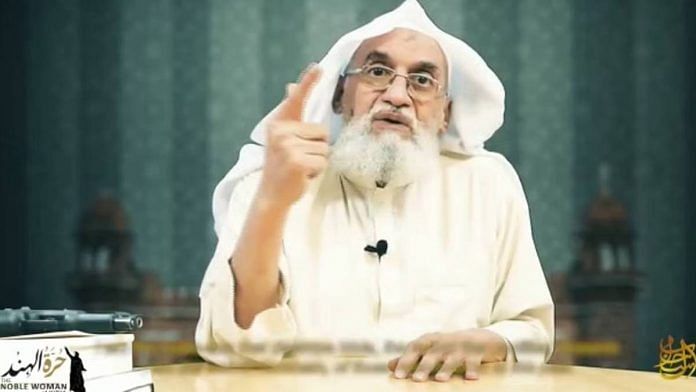New Delhi: More than two years after the US and the Taliban signed the Doha Agreement and almost a year after the radical Islamist group took over Afghanistan, both sides seem to have once again signalled that the peace deal is over even as US President Joe Biden said Tuesday that al Qaeda chief Ayman al-Zawahiri had been killed in a drone attack in Kabul by the CIA.
Washington and Kabul have blamed each other for violating the commitments made under the so-called peace deal, which was signed between Biden’s predecessor Donald Trump and the Taliban in Doha in February 2020.
“By hosting and sheltering the leader of al-Qa’ida in Kabul, the Taliban grossly violated the Doha Agreement and repeated assurances to the world that they would not allow Afghan territory to be used by terrorists to threaten the security of other countries,” US Secretary of State Antony J. Blinken said Tuesday, while announcing Zawahiri’s death.
“They (the Taliban) also betrayed the Afghan people and their own stated desire for recognition from and normalisation with the international community,” he added.
Blinken further said that in the face of the Taliban’s “unwillingness or inability to abide by their commitments”, the US will “continue to support the Afghan people with robust humanitarian assistance and advocate for the protection of their human rights, especially of women and girls”, effectively ruling out any kind of recognition to the interim Taliban regime in Kabul.
The Taliban, on the other hand, said that the Islamic Emirate of Afghanistan (IEA) condemns the attack and stressed that it was a “clear violation of international principles and the Doha Agreement”.
IEA spokesperson Zabiullah Mujahid in a statement said that they are investigating the matter, and warned that such actions will work “against the interests of the USA, Afghanistan and the region”.
Zawahiri was killed Sunday by an American drone that hit his residence, located in the Shirpur area of main Kabul city, as he came out on the balcony of his house. This has given rise to questions on the Taliban’s claims that it will not allow Afghan soil to be used for terrorism.
Also Read: ‘Will tie explosives to our kids’ — Al Qaeda warns India of suicide attacks over Prophet remarks
Tenets of the Doha Agreement
The Doha Agreement, also called the peace deal, was inked in February 2020 after nine rounds of negotiations between the US and the Taliban.
It was signed by former US special envoy for Afghanistan Zalmay Khalilzad and Taliban political chief Mullah Abdul Ghani Baradar, with former US secretary of state Mike Pompeo as a witness.
Under the agreement, the Taliban had given guarantees to the US that it will not allow terrorism to be nurtured on their soil.
Part 1 of the agreement states, “The Islamic Republic of Afghanistan and the United States recognise that al-Qa’ida, ISIS-K and other international terrorist groups or individuals continue to use Afghan soil to recruit members, raise funds, train adherents and plan and attempt to conduct attacks that threaten the security of the United States, its allies, and Afghanistan.”
As a result, both parties had agreed to follow certain “steps to defeat the al-Qa’ida, its affiliates” by way of not allowing these terror outfits to “recruit, train, raise funds (including through the production or distribution of narcotics), transit Afghanistan or misuse its internationally recognised travel documents, or conduct other support activities in Afghanistan, and will not host them.”
‘An exercise in self-delusion’
Rakesh Sood, veteran diplomat and former Indian envoy to Kabul, said, “The Doha Agreement was an exercise in self-delusion on the part of the West, especially the US, whose only interest was to get out of Afghanistan.”
“The only commitment that mattered under the agreement was withdrawal of US troops from that country…The Taliban always has links with the al Qaeda. Over half dozen UNSC reports reiterated that ties between them are intact and stronger than before,” he added.
The four broad areas of the Doha Agreement were — counterterrorism actions by the Taliban, a conditional timeline for US troops’ withdrawal, commencing intra-Afghan talks, and discussion of conditions that would lead to a permanent ceasefire.
Michael Kugelman, deputy director and senior associate for South Asia at the Wilson Center in Washington, said, “The Doha deal was always fragile and open to contradictory interpretations. But the fact of the matter is that Zawahiri was living in Kabul and the Taliban regime did nothing about it. That appears to be a clear violation of the Doha deal stipulation that the Taliban not allow those that threaten the US to be on Afghan soil.”
“The location and length of Zawahari’s stay in Afghanistan shatters once and for all the Taliban-propagated myth that it no longer has ties to al Qaeda. The Taliban had to have known and helped him have that accommodation,” he added.
While the agreement was signed at a time when the US was desperate to close “endless wars”, it lacked teeth by way of an enforcement mechanism under which any of the parties can file a legal dispute in case of a “violation”.
A report in the Middle East Eye quoted Ibraheem Bahiss, an analyst with the International Crisis Group’s Asia programme, as saying: “The Doha agreement never really had an enforcement or arbitration mechanism in it. So, if there’s disagreements on the interpretation of each party’s obligations, there never really was a mechanism that would settle the dispute.”
(Edited by Gitanjali Das)
Also Read: ‘Muslims oppressed in Hindu democracy’: al Qaeda chief al-Zawahiri slams hijab row, praises Muskan



